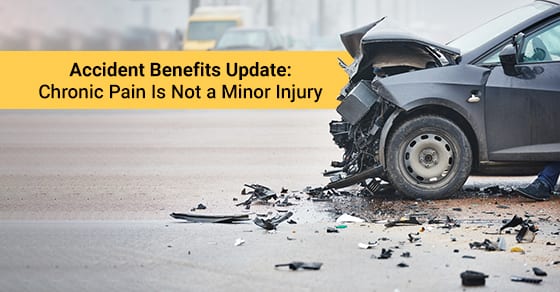
In F.H. and Certas Direct Insurance Company, a recent hearing before the Licence Appeal Tribunal (LAT), the unnamed Applicant sought a declaration that her ongoing post-accident impairments were not subject to the Minor Injury Guideline (MIG) and the $3500 cap on treatment under the MIG.
The Applicant was injured in a motor vehicle accident on August 11, 2015. She suffered widespread soft-tissue injuries which evolved into Chronic Post-Traumatic Pain Syndrome. Certas, her insurer, categorized her injuries as ‘minor’ and restricted her treatment under the MIG. After she exhausted the $3500 available for treatment, the Applicant continued to require ongoing treatment, and submitted a variety of treatment plans, all of which were denied. She commenced this application seeking payment of the disputed treatment plans and several assessments that had been denied by Certas. She also sought a special award claiming that Certas had unreasonably withheld or delayed payment of benefits, and a costs award.
Member Sewrattan reviewed the evidence and concluded that the Applicant’s impairment was not "predominantly minor" and therefore she was not subject to the MIG.
Certas had argued that there was no chronic impairment, and that the Applicant’s soft-tissue injuries were properly captured under the MIG. As evidence, it provided two reports.
The first, by Dr. Hermantas, a family physician, failed to consider the possibility of a Chronic Pain condition at all, despite the Applicant’s ongoing physical and psychological complaints and the evidence of her treatment providers. He also failed to consider the Applicant’s pre-existing Carpal Tunnel Syndrome and surgery as a potential complicating factor. Because of these omissions, Dr. Hermantas was able to conclude that the Applicant had been categorized appropriately.
The Applicant submitted a report by Dr. Joshi, a Pain specialist. In it, he identified Chronic Post-Traumatic Pain Syndrome associated with neck, shoulder, upper and lower back, and left ankle pain, chronic sleep disturbance and mood abnormalities, amongst other issues. The diagnosis was based on several physical and psychological tests including range of motion testing and an extensive formal interview.
Member Sewrattan acknowledged that it was possible that Dr. Hermantas simply did not believe that the Applicant was experiencing ongoing accident-related impairment. However, he was faced with one report that provided credible evidence in support of Chronic Pain and another that did not provide any evidence in opposition. As a result, Member Sewrattan preferred the Joshi report and held that the Applicant did suffer from Chronic Post-Traumatic Pain Syndrome. Based on this, he ordered the Applicant taken out of the MIG.
Since the $3500 treatment cap no longer applied, Member Sewrattan reviewed the disputed treatment plans, finding them reasonable and necessary. Specifically, he found that the disputed Physiotherapy plans, with stated treatment goals of increasing range of motion and strength, and pain reduction, were reasonable given the chronic nature of the Applicant’s condition.
The other disputed treatment plans related to the Joshi assessment and a psychological assessment that had been denied. Earlier, Certas had commissioned a report from Dr. Mor, who concluded that the Applicant did not suffer from a diagnosable psychological condition. She also stated that the Applicant claimed neither to want nor need psychological treatment (the Applicant denied making these claims). The Applicant underwent a psychological assessment with Dr. Lotaflizadeh despite the denial.
Member Sewrattan found that the Applicant’s psychological assessment was reasonable and necessary. The fact that she may have denied needing psychological treatment earlier did not mean that it was unreasonable to explore the possibility that she suffered from a psychological impairment. As well, the report was reasonable because the evidence it contained had been a deciding factor in Member Sewrattan’s decision. By the same logic, payment for the Chronic Pain assessment was granted as reasonable.
Member Sewrattan did not make a special award or costs award in this case. Although Certas had incorrectly maintained its position regarding the MIG, it did not do so unreasonably. Costs under Rule 19 are only available when a party has behaved unreasonably, frivolously, vexatiously, or in bad faith during a proceeding. The decision to place the Applicant in the MIG did not fall under the ambit of the Rule, and none of the insurer’s actions during the proceeding warranted punishment.
If you have been seriously injured in a car accident and have been placed in the MIG, or have questions relating to Chronic Pain or other impairments, please contact us for a free consultation. At Campisi LLP we are experts in accident benefits claims, and are proud to put, "Clients First, Excellence Always".
Subscribe to our newsletter
Get free insights delivered right to your inbox
Give us your email address and we’ll send you the latest information on updates to the legal and insurance system and learn how you can make the best recovery possible.
.jpg?width=726&height=440&name=image%2013%20(1).jpg)
Recent Posts
Put our expertise to work for you.
If you or a loved one has been seriously injured, you need a personal injury lawyer who puts client care first and who also knows how to navigate the complex legal system.
Contact Us Now